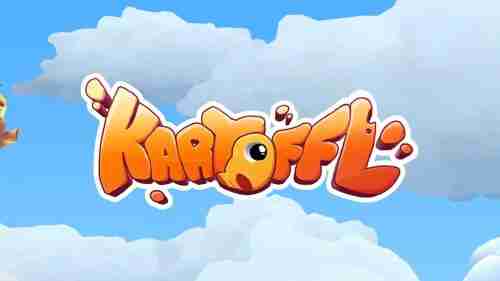Kartoffl is a new VR puzzle game from new VR developers Breach. I’ll start by getting out of the way that, yes, it is ostensibly similar to Lemmings, in that your main task is to guide a group of anthropomorphised creatures through several obstacles to a designated exit. Hopefully, by addressing that nice and early, we can all focus on what Kartoffl has to offer, rather than being distracted by the shadow cast by one of the greatest puzzle games ever made.
So, will Kartoffl entice you to chip away at its puzzles? Or will they have you boiling with rage?
Chip off the old block
Like most games of its kind, Kartoffl places its levels into the VR space as a kind of floating island and allows the player to manipulate them through interactions with the controllers.
You can zoom in and out and move around in all directions as you’d imagine. Despite this being a relatively sedate experience, the developers have provided fully featured comfort options for those of a particularly sensitive disposition.
As you start each level, a puzzle is laid out before you. There’s a starting point, a finish point, and an incomplete pathway between. The player’s task is to guide a set number (not always 100%) of the little potato people, that the game calls Spuds, from start to finish by adding elements to the scene that will allow them to safely navigate the route.

It starts simply: Place a launch pad to jump a gap. insert a corner piece so the potato folk don’t tumble to their doormat at a turn, or simply place a bridge over a gap.
As you would expect, things quickly get more complicated. By the time your level number is in the high teens, you’ll be presented with start and finish points with nothing in between and not enough pieces to traverse the gap – and this is where the game comes into its own.

With limited resources available, and increasingly large or trap-laden levels to guide your Spuds through, recycling of elements becomes essential and adds a welcome urgency to a game where there is no time limit or other overt threat.
Pota-tonally consistent
The blocks that comprise most levels and other elements like trees and stone monoliths are rendered in a bright, blocky, playful style that is mirrored in the upbeat music and cartoonish sound effects.
It would be easy to dismiss these audiovisual design choices as basic or a bit unadventurous, and there’s nothing ground-breaking or exciting here. But Kartoffl brings it all to bear with a rather nice central theme of natural materials – and the Spuds themselves, with their helicopter-leaf hair and cheerful expressions, are completely adorable.
Half-baked?
One small frustration is that with Spuds wandering in all directions and gadgets and gizmos pinging them around the levels, the rules on what constitutes a Spud-on-Spud collision are disappointingly inconsistent.

Other death states are very well-defined: Fall more than two block heights, and it’s mashed potato, spring a potato into a wall or the propeller on the underside of a hovering block: Mashed potato, Bump two Spuds into each other, and it’s mashed potato… Sometimes… and other times they clip through each other harmlessly.
In a game that encourages experimentation and creative problem-solving, it’s not a huge deal – it just feels out of keeping with an otherwise tightly delivered experience.
A crisp challenge
Kartoffl offers 60 levels, with secondary objectives of collecting three stars and guiding every potato to safety in each. I cracked through the first 20 with all potatoes and stars in about an hour, but the challenge steepens at that point and the playtime, not to mention the satisfaction, increases along with it. Getting every stage ticked off with three stars is likely to take 4-6 hours, depending on your skill and stubbornness with those additional goals.
Thankfully, this relatively small amount of content is reflected in the relatively small price tag of $14.99
#Hash-tag: Jack-Pot?
While it’s tempting to assess Kartoffl alongside that ‘other’ game, any amount of time spent with the adorable Spuds exposes this as a lazy comparison that misrepresents the game that developers, Breach, have put together.

Kartoffl’s ace card is that it encourages a creative approach to solving its puzzles.
From only a short way through its 60 levels, there ceases to be a single solution to hunt for. Stages open up and offer an almost infinite number of ways to guide your potato-headed gang to the goal, with the only constraint being how quickly you can move the elements from one point in the stage to another.
Fortunately, the controls are tight, responsive, and simple enough to facilitate this, empowering the player with the tools required to be as inventive or direct as they like with their solutions.

There’s no ignoring that this is a slight offering, with a style and execution that could, uncharitably, compared to something you’d find on the store of your mobile device, but this would be to do Kartoffl a huge disservice.
In VR, Kartoffl benefits hugely from the ability to fully manipulate the game’s elements within the space. More importantly, the game is enjoyable and challenging from the start and is hugely addictive – as demonstrated by it triggering the coveted ‘Low Battery’ accolade on my very first play.







